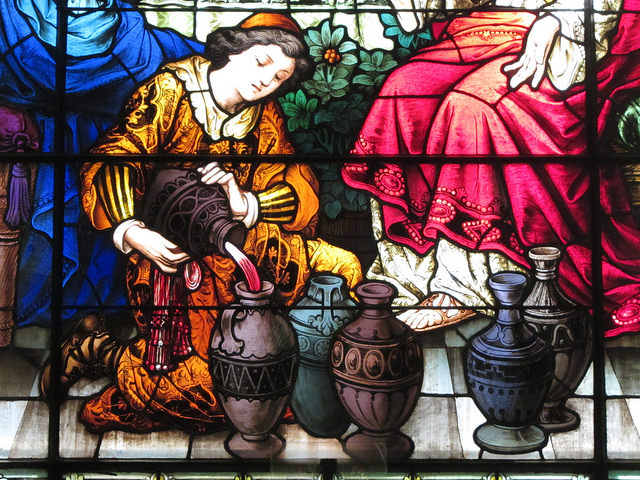I love this miracle — not just because I live in Minnesota and wish I could perform such a sign on Sundays when my wine rack is empty and I’d like a nice bottle of Chianti to pair with my pasta. I love this miracle — not just because it’s unique to John and all y’all know how much I love John. I love this miracle — not just because this is the best way ever to launch one’s career — being the life of the party.
I love this miracle because I know of no other event in the gospels that creates an experience of God’s grace upon grace better than the wedding at Cana.
The abundance in the details of this sign are meant to show us what grace upon grace (John 1:16) looks like, smells like, tastes like, feels like, and sounds like. This is no ordinary miracle, no “business as usual” kind of miracle for Jesus, as if that even exists. There’s a reason for this sign being the first public act of Jesus’ ministry in John — not a sermon (Matthew/Luke), not an exorcism (Mark), not a healing or walking on water, but changing 120-180 gallons of water into the best wine. And just how many bottles are we talking about? Consider these facts:
“A standard bottle of wine is 750 milliliters (ml), meaning a case of 12 bottles contains 9 liters, or 2.378 gallons. At 150 gallons per ton, a ton of grapes becomes 150/2.378 gallons per case, or a little more than 63 cases of wine. With 12 bottles per case, we have 756 bottles in total.” |
And since we are talking about God, let’s round up and assume 180 gallons for the miracle at Cana. We’re talking close to a 1000 bottles of wine.
And how many grapes per bottle of wine? According to the same source referenced above, 2.6 pounds of grapes yields one bottle of wine. Yes, we really are talking about a ton of grapes — over a ton. What difference do these facts make? Because it starts breaking down for us, in ways we might better grasp, just how much grace is implied here. This is no exaggeration — or, actually, it is. Because this is an act of exaggerated grace, extravagant grace, excessive grace.
Six jars, twenty to thirty gallons each, filled to the brim, of the best wine, when you least expect it. Think about what that looks like — six tall stone jars. Do a Google search of images for this miracle and notice how those jars are made sure to be visible. Think about what that smells like. Stick your nose deep in that unexpected glass of a lovely wine, because it’s that first smell that anticipates that first taste. Think about what that tastes like, what flavors you might detect, how does it finish? Think about how that feels, that unexpected deliciousness of a well-aged, top-shelf wine, when there is no reason to anticipate such a moment. The wine ran out — and you get served the good wine when it should be served first. And think about what that sounds like. This is maybe harder to sense, but it comes in the form of Mary’s command — “do whatever he tells you.” Those who do experience grace upon grace — “give me a drink” (the Samaritan woman at the well, John 4); “Stand up, take your mat and walk” (the man ill for thirty-eight years, John 5); “Make the people sit down” (the feeding of the five thousand, John 6); “Go, wash in the pool of Siloam” (the healing of the man born blind, John 9); “Lazarus, come out” (the raising of Lazarus from the dead, John 11).
Epiphanies, it seems, are embodied revelations. They are manifestations of God’s presence that we should be able to sense — with every single one of our senses. The wedding at Cana reveals that epiphanies of God are experiences of God’s love, so abundant that you can sense it in every part of your body.
And as much as we want to think this grace is only for us, this epiphany also shows us that God’s grace is to be shared with others. The setting of this first sign is essential — a wedding. All the guests will get to experience this act of grace. All will watch the steward pour wine in their glasses when they thought their cups would stay empty. All will get that first smell and be surprised. All will take that first sip and say, “where did this come from?” All will have the opportunity to respond to Jesus’ voice and know life (John 10:16). Because God’s grace is for all (1 Corinthians 12:7) and it’s awfully hard, even impossible, to restrain abundance, especially God’s, although we try very hard to do so.
Grace upon grace (John 1:16) is not a concept but the incarnation of God’s love; not an idea but the experience of God’s love; not something to be kept to ourselves but to go about testifying because God loves the world (John 3:16) — which is, in the end, Dear Working Preachers, the real heart of Epiphany.
Karoline

